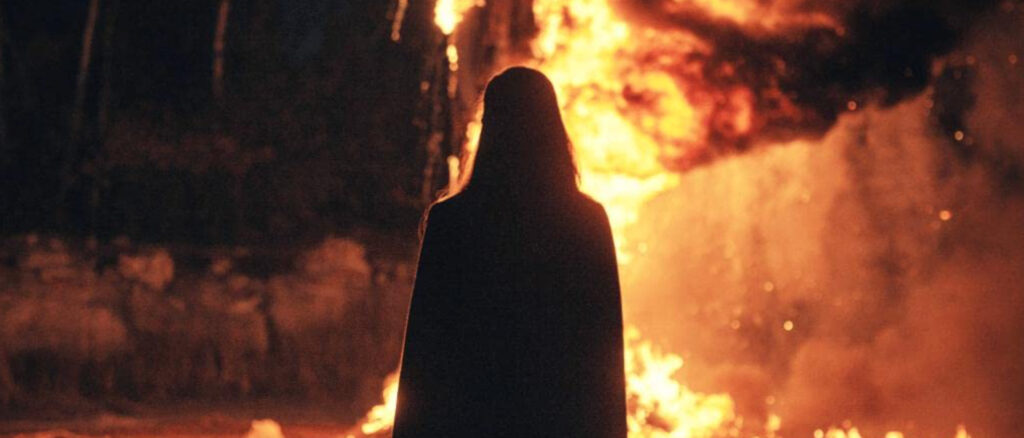“Blood” is a Tender and Terrifying Story of Motherly Sacrifice

In the long history of cinema, few creatures have been depicted as frequently as vampires. Over the years we’ve seen a variety of bloodsucking variations from suave predators, angsty 80s heartthrobs, sparkly prom dates, and toothy feral monsters. At this point it’s rare to encounter a cinematic vampire that feels unique. Director Brad Anderson’s new horror film, Blood, manages to give us just that with a heartbreaking story about a mother who would do anything for her child. Anderson uses a monstrous archetype to explore a tender story of addiction, sacrifice, and motherly love dressed up as the horrifying birth of a young vampire. What begins as a family drama about a woman clinging to the remnants of her shattered life spirals into a nightmare as the son she’s trying to save literally bleeds her dry.
Jess (Michelle Monaghan) is a nurse and mother in the midst of a contentious divorce. Hoping for sole custody of their two children, her ex-husband Patrick (Skeet Ulrich) keeps leaning on her past addiction as proof that she is unfit to raise them. Unfortunately, he might have a point. Though she’s been clean for over a year, Jess has a difficult time connecting with Tyler (Skylar Morgan Jones) and Owen (Finlay Wojtak-Hissong) and each day reveals how much of their lives she’s already missed. When a horrific accident lands Owen in the hospital, Jess takes it upon herself to nurse him back to health and tears herself apart to administer the only treatment that seems to work: fresh human blood. As Owen’s thirst grows, her life descends into a chaotic hell that feels frighteningly familiar.
Despite a vast and varied career in film and television, Anderson is perhaps best known in the horror world for his intensely frightening Session 9. The story of a haunted asylum, Anderson uses a straightforward horror trope to explore the life of a new father struggling under the weight of his responsibilities. Anderson tackles similar themes here by deconstructing the concept of vampirism as a backdoor into a harrowing story of a woman trying to put her life back together. Not quite a slow burn, Blood takes its time building empathy for a flawed heroine and slowly builds tension until the overt horror rears its head in the final act. Told through Jess’s point of view, we become so invested in her attempts to save Owen that we allow ourselves to believe everything will work out if she can just hold on a little longer. Owen’s gradual transformation is all the more horrific for the time we’ve invested in this struggling family and we want Jess to succeed despite the fact that we are watching her turn into a monster herself.
Monaghan carries the film’s emotional arc well as a beleaguered woman desperate to hold onto her children. Ulrich is wonderfully frustrating as the combative yet relatable Patrick. Scenes in which he dotes on his children add humanity to a role that could easily have become an empty caricature. Wojtak-Hissong gives a heartbreaking performance as the ill-fated Owen, a little boy terrified by what is happening to him, but powerless to resist his growing thirst. However, weaving through these heartfelt performances is the film’s secret weapon, Skylar Morgan Jones. As the older child of divorce, Tyler is constantly tasked with keeping the peace while everyone else gets to fall apart. Put in charge by her stressed-out mother, she blames herself for Owen’s fate and must overcome her own terror to take on caregiving responsibilities way too demanding for her tender age. It’s a subtle but effective performance that validates the horrors of divorce and the trauma of responsibility among children of broken families that often goes unrecognized.
As in Session 9, Anderson uses the cover of a story about a young vampire to explore the horror of addiction. Jess is forced to revisit patterns she used to hide her drug habit in order to keep Owen’s growing thirst under wraps. Though she is simply trying to feed her son, Jess resorts to criminal behavior in order to keep his secret, worried that any worsening of his condition will put her claim to custody in danger. Patrick blames her for everything and makes it abundantly clear that he does not trust her with her own children, causing her to further retreat into secrecy. Will Honley’s intimate screenplay wisely begins the story deep into Jess’s recovery. With only brief glimpses of her at rock bottom, it’s difficult to believe she deserves this kind of punishment. Her addiction is contrasted with Owen’s uncontrollable thirst making a powerful statement about the way society treats drug addicts and those in recovery. We would hardly expect Owen to be blamed for his addiction and receive the same kind of shame and derision Patrick heaps upon Jess.
Session 9 is known to horror fans as one of the most haunting films of all time, precisely for the kind of subtlety Anderson brings to Blood. The film’s title takes on a multitude of meanings as the literal substance keeping Owen alive, a representation of how much Jess will give of herself to save her child, and the tenuous bonds that bind her shattered family together. What appears at first glance to be an intimate look at the creation of a vampire draws the viewer in with a complex and heartbreaking family drama further amplifying the horror on its surface. Watching Jess bring herself to the brink of death to save her son allows us all to contemplate her actions without judgment and wonder how far we would go to save someone we love.
Jenn Adams is a writer, podcaster, and film critic from Nashville, TN. Find her social media nonsense @jennferatu.